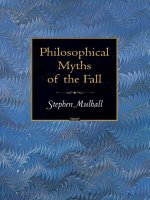princeton university press the nature of rationality jun 1993
Bạn đang xem bản rút gọn của tài liệu. Xem và tải ngay bản đầy đủ của tài liệu tại đây (1.83 MB, 243 trang )
THE NATURE OF
RATIONALITY
This page intentionally left blank
THE NATURE OF
RATIONALITY
Robert Nozick
PRINCETON UNIVERSITY PRESS
PRINCETON, NEW JERSEY
COPYRIGHT ¿ 1993 BY ROBERT NOZICK
PUBLISHED BY PRINCETON UNIVERSITY PRESS, 41 WILLIAM STREET,
PRINCETON, NEW JERSEY 08540
IN THE UNITED KINGDOM: PRINCETON UNIVERSITY PRESS,
CHICHESTER, WEST SUSSEX
ALL RIGHTS RESERVED
LIBRARY OF CONGRESS CATALOGING-IN-PUBLICATION DATA
NOZICK, ROBERT.
THE NATURE OF RATIONALITY / ROBERT NOZICK.
P. CM.
INCLUDES INDEX.
ISBN 0-691-07424-0
1. REASONING. 2. REASON. I. TITLE.
BC177.N69 1993 128¢.3—dc20 92-46660
THIS BOOK HAS BEEN COMPOSED IN ADOBE PALATINO
PRINCETON UNIVERSITY PRESS BOOKS ARE PRINTED
ON ACID-FREE PAPER AND MEET THE GUIDELINES FOR
PERMANENCE AND DURABILITY OF THE COMMITTEE ON
PRODUCTION GUIDELINES FOR BOOK LONGEVITY
OF THE COUNCIL ON LIBRARY RESOURCES
PRINTED IN THE UNITED STATES OF AMERICA
13579108642
To Carl Hempel
AND TO THE MEMORY OF
Gregory V lastos
This page intentionally left blank
CONTENTS
A
CKNOWLEDGMENTS
ix
I
NTRODUCTION
xi
I. How to Do Things with Principles 3
Intellectual Functions 3
Interpersonal Functions 9
Personal Functions 12
Overcoming Temptation 14
Sunk Costs 21
Symbolic Utility 26
Teleological Devices 35
II. Decision-Value 41
Newcomb’s Problem 41
Prisoner’s Dilemma 50
Finer Distinctions: Consequences and Goals 59
III. Rational Belief 64
Cognitive Goals 67
Responsiveness to Reasons 71
Rules of Rationality 75
Belief 93
Bias 100
IV. Evolutionary Reasons 107
Reasons and Facts 107
Fitness and Function 114
Rationality’s Function 119
V. Instrumental Rationality and Its Limits 133
Is Instrumental Rationality Enough? 133
Rational Preferences 139
Testability, Interpretation, and Conditionalization 151
Philosophical Heuristics 163
Rationality’s Imagination 172
viii CONTENTS
N
OTES 183
SUBJECT
I
NDEX
219
I
NDEX OF
N
AMES
224
ACKNOWLEDGMENTS
T
HE FIRST two chapters of this book were originally delivered as
Tanner Lectures at Princeton University on November 13 and
15, 1991. I had been a graduate student at Princeton, and the
lectures were dedicated, as is this book, to my teachers there. Chapters
1 and 2 are reprinted with the permission of the University of Utah
Press from the Tanner Lectures on Human Values, vol. 14 (Salt Lake City:
University of Utah Press, ¿ 1992). (Some additions and changes have
been made in the versions printed here.) First drafts of these two chap-
ters were written at the Rockefeller Foundation Research Center at Bel-
lagio, Italy, in the summer of 1989.
Portions of Chapter 5 constituted the Walter C. Schnackenberg Me-
morial Lecture, given at Pacific Lutheran University in March 1990.
Parts of Chapters 3–5 were given as a Centennial Lecture at the Uni-
versity of Chicago in May 1992.
I am grateful to the discussants of the lectures at Princeton—Gilbert
Harman (who also read the complete manuscript), Clifford Geertz,
Susan Hurley, and Amos Tversky—and also to Scott Brewer, Eugene
Goodheart, David Gordon, Christine Korsgaard, Elijah Millgram, Bill
Puka, Tim Scanlon, Howard Sobel, and William Talbott for their very
helpful comments and suggestions. Special thanks go to Amartya Sen
for many stimulating discussions of this material, inside classes we
have taught together and out.
I am very grateful to Laurance Rockefeller for his interest in and
generous support of this research project.
I thank my wife, Gjertrud Schnackenberg, who made the years dur-
ing which this book was written so romantic and loving—and such
fun.
This page intentionally left blank
INTRODUCTION
T
HE WORD philosophy means the love of wisdom, but what phi-
losophers really love is reasoning. They formulate theories and
marshal reasons to support them, they consider objections and
try to meet these, they construct arguments against other views. Even
philosophers who proclaim the limitations of reason—the Greek skep-
tics, David Hume, doubters of the objectivity of science—all adduce
reasons for their views and present difficulties for opposing ones.
Proclamations or aphorisms are not considered philosophy unless
they also enshrine and delineate reasoning.
One thing philosophers reason about is reasoning itself. What prin-
ciples should it obey? What principles must it obey? Aristotle initiated
the explicit formulation and study of deductive principles, writers on
science and probability theory delineated modes of nondeductive rea-
soning and support, Descartes attempted to show why we should trust
the results of reasoning, Hume questioned the rationality of our doing
so, and Kant demarcated what he held to be reason’s proper domain.
This delineation of reason was not an academic exercise. Discoveries
were to be applied: people’s reasoning was to be improved, their be-
liefs and practices and act ions made more rational. Inquiring into the
rationality of contemporary beliefs and practices carries risks, Socrates
discovered. The traditions of a society sometimes do not withstand
scrutiny; not everyone wishes to see the implicit examined explicitly.
Even the simple consideration of alternatives can seem a corrosive
undercutting of what actually exists, an exposure of arbitrariness.
Rationality fixed human distinctiveness, the Greeks held. “Man is a
rational animal.” The capacity to be rational demarcates humans from
other animals and thus defines them. Human specialness has repeat-
edly been contracted since the Middle Ages—this was the first large
statement about intellectual history that I recall reading. Copernicus,
Darwin, and Freud taught us that human beings do not occupy a spe-
cial place in the universe, they are not special in their origin and are
not always guided by rational or even consciously known motives.
What continued to give humanity some special status, though, is its
capacity for rationality. Perhaps we do not consistently exercise this
valuable attribute; yet it sets us apart. Rationality provides us with the
(potential) power to investigate and discover anything and every-
thing; it enables us to control and direct our behavor through reasons
and the utilization of principles.
xii INTRODUCTION
Rationality therefore is a crucial component of the self-image of the
human species, not simply a tool for gaining knowledge or improving
our lives and society. Understanding our rationality brings deeper in-
sight into our nature and into whatever special status we possess. The
Greeks saw rationality as independent of animality, certainly not its
outgrowth. Evolutionary theory makes it possible to see rationality as
one among other animal traits, an evolutionary adaptation with a de-
limited purpose and function.
This perspective can yield important consequences for philosophy,
I believe. Rationality has not been merely the philosophers’ special
love and an important part of their subject matter; it has been their
special tool for discovering truth, a potentially unlimited one. (In the
Critique of Pure Reason, Kant gave reason a humbler function: not to
cognize the heart of an independent reality but to know an empirical
realm that it partially constitutes and shapes. Still, its valid scope re-
mained extremely large.) If rationality is an evolutionary adaptation
with a delimited purpose and function, designed to work in conjunc-
tion with other stable facts that it takes for granted and builds upon,
but if philosophy is an attempt of unlimited scope to apply reason and
to justify rationally every belief and assumption, then we can under-
stand why many of philosophy’s traditional problems have turned out
to be intractable and resistant to rational resolution. These problems
may result from attempts to extend rationality beyond its delimited
evolutionary function. I have in mind here the problems of induction,
of other minds, of the external world, and of justifying goals. I shall
explore the consequences and implications of this evolutionary per-
spective later on.
In recent years, rationality has been an object of particular criticism.
The claim has been put forth that rationality is biased because it is a
class-based or male or Western or whatever notion. Yet it is part of
rationality to be intent on noticing biases, including its own, and con-
trolling and correcting these. (Might the attempt to correct for biases
itself be a bias? But if that is a criticism, from what quarter does it
come? Is there a view that holds that bias is bad but that correcting it
is bad too? If it is held to be impossible to eliminate bias, then in what
sense does charging bias constitute a criticism? And would such im-
possibility mean that there is some one particular bias that is intrin-
sically resistant to elimination or just that not all biases can be elimi-
nated simultaneously?)
Charging a bias in existing standards does not show that one exists.
That is done by using reasoning and evidence—hence using our exist-
ing standards—to reach the conclusion that these standards them-
INTRODUCTION xiii
selves, in some applications, show some particular specified distor-
tions and biases. It is not sufficient merely to say that we (all) see the
world through our conceptual schemes. The question is: In what spe-
cific ways, and by what exact mechanisms, do our particular concep-
tual schemes and standards distort? Once we are shown this, we can
begin to make corrections. Of course, our current standards of ratio-
nality are not perfect—in what year should we suppose they became
so? But they have real virtues, and to show that they are flawed re-
quires rational argumentation of at least the same weight as those
standards being attacked. Detecting particular such flaws is the nec-
essary first step toward repairing them and toward formulating the
standards of rationality more adequately. So evidence for charges of
bias in standards should be welcomed and sought out. Standards of
rationality are a means whereby we rise above, or check, our own par-
ticular hopes, wishes, and biases. It would be ironic and tragic if the
current widespread criticism of standards of rationality had the effect
of removing or undercutting one of the major ways through which
humanity is able to correct and rise above personal and group bias.
The study of rationality, which is of such great evaluative and prac-
tical importance both personally and socially, has gotten transformed
into a technical subject. Principles were sharpened to delineate valid
reasoning and to capture the patterns of belief and action supported
by reasons. Deductive logic was transformed by Gottlob Frege in the
late nineteenth century and burst into technical elaboration in the
twentieth. Systems of logic were developed and their own properties
and limitations were explored using logical techniques. Probability
theory led to formal theories of statistical inference, and mathematiza-
tion permeated attempts to theorize about the rationality of belief and
to formulate the rudiments of an inductive logic, or at least of induc-
tive rules of acceptance. A sleek and powerful theory of rational ac-
tion—decision theory—was developed in this century by mathemati-
cians, economists, statisticians, and philosophers, and now this theory
is applied in a wide variety of theoretical and practical contexts. (The
apparatus of this theory provides the framework for the formal theory
of rational strategic interaction, game theory, the formal theory of so-
cial choice and welfare economics, the theory of microeconomic phe-
nomena, and elaborate theories of the political realm.) The relevant lit-
erature is sprinkled with, when not wholly engulfed by, forbidding
formulas in unfamiliar symbolic notations that are elaborated into
mathematical structures. I do not decry this turn. These current theo-
retical developments are continuous with the earlier motivations and
concerns, and they carry the inquiry much further.
xiv INTRODUCTION
This book too will take account of such technicalities and propose
some new ones in the two major areas covered by theories of ratio-
nality: rationality of decision and rationality of belief. We shall refor-
mulate current decision theory to include the symbolic meaning of
actions, propose a new rule of rat ional decision (that of maximizing
decision-value), and then proceed to trace the implications of this rule
for the Prisoner’s Dilemma and for Newcomb’s Problem. The ratio-
nality of belief involves two aspects: support by reasons that make the
belief credible, and generation by a process that reliably produces true
beliefs. (The evolutionary account I offer to explain the puzzling con-
nection between these aspects reverses the direction of Kant’s “Coper-
nican Revolution.”) I shall propose two rules to govern rational belief:
not believing any statement less credible than some incompatible alter-
native—the intellectual component—but then believing a statement
only if the expected utility (or decision-value) of doing so is greater
than that of not believing it—the practical component. This twofold
structure then is applied to issues about the “ethics of belief” and a
new resolution of the “lottery paradox” is proposed. I also shall ex-
plore the scope and limits of instrumental rationality, the effective and
efficient pursuit of given goals, and propose some new conditions on
the rationality of goals. Because rational thinking also encompasses
the formulation of new and fruitful philosophical questions and ideas,
some heuristics for doing this shall be presented. Thus, this book is
awash in technical details needed to push thinking on the fundamental
issues of rationality further.
Yet there is some cause for concern. Until recently, questions about
rationality had been the common possession of humankind, some-
times discussed in intricate trains of thought—no one could claim that
Kant’s Critique of Pure Reason is an easy book—but, nevertheless,
largely accessible to intelligent people willing to make the effort. New
thoughts on these questions were part of the general culture; they
shaped the terms of discussion and debate, and sometimes even of
sensibility (recall how greatly Kant’s thought influenced Coleridge).
Now things are different—and not just with the topic of rationality.
The most fruitful and interest ing lines of inquiry about many topics
of fundamental human concern have taken an increasingly techni-
cal turn. It is impossible now to discuss these topics adequately with-
out a grasp of these technical developments, of the new questions
they open, and of the ways some traditional positions are undercut.
When the Encyclopedia Britannica recently published its (second)
edition of “Great Books of the Western World,” this occasioned
some public controversy over the representation—or relative lack—of
women and minorities, and over the putative elitism of any canon of
INTRODUCTION xv
great works.* What received no comment, however, was that many of
the greatest intellectual works of the twentieth century were omitted,
presumably because they were too technical for the intelligent gener-
ally educated reader.
The point is not just that interesting thoughts and results have oc-
curred in this century that are inaccessible to large portions of even a
well-educated population—that has been true since Newton. Rather,
now these ideas concern topics we want and need to understand, top-
ics we think everyone should understand. Yet without some technical
familiarity, these topics cannot be understood or intelligently dis-
cussed. The very terms of evaluation have become technical.
Let me give some examples of topics that have undergone technical
development. (1) The notion of the general welfare (and Rousseau’s
notion of the “general will”) and an understanding of the purposes
of democratic voting procedures have been transformed by Kenneth
Arrow’s Impossibility Theorem. This shows that several extremely
natural and desirable conditions, which apparently should be satisfied
by any procedure for determining the general welfare or the democrat-
ically most preferred alternative, cannot all be satisfied together.
Something has to give. (2) Amartya Sen’s work on the Paretian liberal
paradox shows that a very natural interpretation of the scope of indi-
vidual rights and liberties, and of how the choices of society should be
rationally organized, cannot be easily fit together. These notions need
a new structuring. (3) The fundamental nature of the physical world—
the structure of space and time—cannot be understood apart from the
technicalities (and mathematics) of space-time as presented in general
relativity theory. (4) Similarly for the nature of causality and of the
independent character of the physical world as these are depicted in
the most precise and successful scientific theory we now possess,
quantum field theory. (5) Discussion of the nature and status of mathe-
matical truth—since the Greeks, the exemplar of our best and most
certain knowledge—has been drastically transformed by Kurt Gödel’s
incompleteness theorems. (6) The nature of infinity and its various
levels is now elaborated and explored in contemporary set theory.
(7) Without the theory of how a price mechanism and associated insti-
tutions of private property make rational economic calculation possi-
ble, and the decades-long theoretical discussion of whether rational
calculation was at all possible in a socialist society, one cannot under-
*
I myself do not find a uniform edition of the works of many different authors, with
the series title emblazoned more prominently than the titles of the individual works or
the authors’ names, a fitting presentation of the written accomplishments of the mind.
It might be useful, however, for a group to publish a list of such books and to reprint
those not easily available; different groups might publish different lists.
xvi INTRODUCTION
stand why it is that communist societies were so economically ineffec-
tive. (8) Concerning aspects of individual rationality and rational inter-
actions among persons, there have been many theoretical advances:
decision theory, game theory, probability theory, and theories of sta-
tistical inference.
For each of these topics, this century has seen dramatic new results
and theories, ones that are difficult to understand or to discuss respon-
sibly without an understanding of the technical structures and details.
This is, I realize, a philosopher’s list; social and natural scientists
would add further topics. That reinforces my point. The common cul-
ture of intelligent, educated, and serious people has lost its grip on
many topics that are central to understanding and thinking about soci-
ety or people or the universe at large. The claim that there are compli-
cated scientific factual issues for whose resolution we must turn to ex-
perts, experts who perhaps will disagree—for instance, issues about
the environmental effects of various practices—is familiar. What is
new is this: many of the very terms and concepts of evaluation and
understanding that we wish to use have themselves become technical.
I raise this issue without a solution to propose. Of course, exposi-
tions of these materials are needed for the general reader. But the
clearest of these, if it is indeed to convey the essential ideas accurately,
will involve some technical descriptions and developments—and thus
be limited in its readers. The task is even more difficult for a work
that presents and explores new ideas. I do not want the topic of ratio-
nality to be taken away from the general reader. Yet some ideas can be
stated, specified, or defended only in a somewhat technical manner. I
have tried to minimize these technical details, or at least confine them
to specific sections. For the intellectual health of our society—not to
mention the social health of our intellectuals—the fundamental ideas
must stay public.
THE NATURE OF
RATIONALITY
This page intentionally left blank
I
HOW TO DO THINGS WITH PRINCIPLES
W
HAT are principles for? Why do we hold principles, why do
we put them forth, why do we adhere to them? We could
instead simply act on whim or the passion of the moment,
or we could maximize our own self-interest and recommend that oth-
ers do the same. Are principles then a constraint upon whim and self-
interest, or is adherence to principles a way of advancing self-interest?
What functions do principles serve?
Principles of action group actions, placing them under general ru-
brics; linked actions are then to be viewed or treated in the same way.
This generality can serve different functions: intellectual, interper-
sonal, intrapersonal, and personal. I start with the intellectual.
Intellectual Functions
Consider judicial decisionmaking. In one imaginable system, a judge
simply decides a case so as to yield what she thinks is the best or pref-
erable result in that particular case. Another system of judicial decision
involves principled decision: a common law judge is to formulate a
principle to fit (most or almost all) precedents and a range of hypothet-
ical cases, and then use this principle to decide the current case.* The
attempt to formulate an acceptable general principle is a test of your
judgment about the particular case: is there some adequate general
principle—a principle that gives the right result in all established cases
and obvious hypothetical ones—that also yields the result you want in
this case? If you cannot find such a principle, reconsider what result
you do want in this case.
Such a procedure is a test of a particular judgment on the assump-
tion that any correct judgment is yielded by some true acceptable gen-
* My aim here is to highlight some general features that principles have outside of the
legal realm by analogy to some aspects of judicial decision, not to present a complete
picture of the functioning of legal institutions. What is illuminating is the analogy be-
tween how a current judicial decision is to be yielded by a principle that fits past prece-
dents and how (outside the law) a principle is to yield correct judgments. That within
the legal system stare decisis is itself a (higher-order) principle of the law that may some-
times conflict or compete with other principles need not concern us now.
4 HOW TO DO THINGS WITH PRINCIPLES
eral principle, that true particular judgments are consequences of gen-
eral principles applied to specific situations. Failure to uncover an ac-
ceptable general principle that yields some judgment in particular may
mean that there is no such acceptable principle, in which case that par-
ticular judgment is mistaken and should be abandoned. Or perhaps
you have not been astute enough to formulate the correct principle.
We have no mechanical procedure to decide which explanation is
correct.
1
When you find a general principle or theory that subsumes this case,
a principle you would be willing to apply to other cases as well, this
particular judgment receives new support. Consider empirical data
points a,b,c,d. If a straight line is the simplest curve through these, this
supports the prediction that another point e, also on that straight line,
will hold. It is not an easy matter, inductive logicians have discovered,
to isolate and explain how a (relatively) simple lawlike statement can
group existing data points so that inferences and predictions legiti-
mately can be made to new points. Nevertheless, we do not doubt that
data can support the hypothesis that a law holds and also support a
prediction that a new point will accord with that law. Similarly, the
simplest principle that covers acceptable normative points a,b,c,d also
will support an additional judgment e (that fits this principle) as a cor-
rect normative point too. A theorist gains confidence in his particular
judgment (or side in a controversy) when he can formulate a general
principle or theory to fit it, especially one that is appealing on its face.
2
Philosophers of science have tried to demarcate scientific laws from
accidental generalizations. Accidental generalizations only happen to
hold, or to have held, true. From such a generalization, for example,
that all the coins in my pocket are dimes, one cannot infer a subjunc-
tive statement such as: If there were an additional coin in my pocket
now, it would be a dime. (From a scientific law, on the other hand—for
instance, that all freely falling bodies fall a distance equal to 1/2gt
2
—
we can infer that if some other object now at rest were in free-fall for
t seconds it would travel a distance equal to 1/2gt
2
.) If all previous
data fit a given generalization, we can plausibly infer that new data
would fit it (and hence predict that new data that will be gathered will
fit it) only if that generalization is of lawlike form and is a candidate for
being a law. It is when data fall under a lawlike statement (or arise
from several of them) that we can legitimately extrapolate to further
cases. The features of a lawlike statement, those aspects that differ-
entiate it from an accidental generalization, constitute our license to
travel from given data to predictions or expectat ions about further
data. Similarly, for particular normative judgments, what licenses us
INTELLECTUAL FUNCTIONS 5
to travel to a further judgment on the basis of previous ones is that the
previous ones all fall under a normative general principle. The features
of a normative principle license a subjunctive inference to a new case
that steps beyond the indicative instances that happen already to have
fallen under it. Principles are transmission devices for probability or
support, which flow from data or cases, via the principle, to judgments
and predict ions about new observations or cases whose status other-
wise is unknown or less certain.
What features enable principles to transmit probability? The follow-
ing features have been mentioned to distinguish scientific lawlike
statements (or nomic universals) from accidental generalizations.
3
Lawlike statements do not contain terms for particular individual ob-
jects, dates, or temporal periods—or if they do, these statements can be
derived from more general lawlike statements that do not. Lawlike
statements contain purely qualitat ive predicates: stating the meaning
of these does not require reference to any particular object or spatio-
temporal location. Lawlike statements have an unrestricted universal-
ity; they are not simply a finite conjunction that was established by
examining all cases. Lawlike statements are supported not just by in-
stances falling under them but also by a linkage of indirect evidence.
These very same features might be what enables a normative prin-
ciple to license the derivation of new judgments from previously ac-
cepted ones. Writers on ethics frequently state that ethical principles
must be formulated using general terms only—no names of particular
persons, groups, or nations. This feature might enable a principle to
license an inference to a new case, hence enable new normative judg-
ments to be supported by previous ones. A generalization lacking this
feature of nonparticularity might be, at best, an accidental one, incapa-
ble of transferring support from some data to others. When moral
principles are general and do not contain any nonqualitative predi-
cates or particular names, rather than being a specifically moral aspect
of the principles, this feature might link data or judgments together
to support subjunctive inferences. It would be worthwhile to investi-
gate how much of the “form” of moral principles is necessary for such
linkage.
This does not mean these features are tagged onto weaker general-
izations to make moral principles that perform inferential functions,
any more than such features are tagged onto accidental generaliza-
tions to make scientific laws. One can hold that scientific laws and
moral principles hold true apart from any constructions we add or any
uses of them we make, that their independent truth is what makes
these uses possible. Nevertheless, features such as generality, no
6 HOW TO DO THINGS WITH PRINCIPLES
proper names, and no positional predicates would not be specifically
moral features but lawlike ones, necessary for anything to be a law,
scientific or moral. In the appropriate context, features that are not
specifically moral can have moral consequences.
A person may seek principles not only to test his own judgment or
give it more support but also to convince others or to increase their
conviction. To do this he cannot simply announce his preference for a
position; he must produce reasons convincing to the others. Reasons
might be very particular, but they also can be general considerations
that apply well to a wide range of cases and point to a particular judg-
ment in this instance. If these judgments in the other cases are ones the
other person already accepts, then the general reasoning will recruit
these cases as evidence and support for the judgment proposed in the
present case. Principles or general theories thus have an interpersonal
intellectual function: justification to another. Justification by general
principles is convincing in two ways: by the face appeal of the princi-
ples and by recruiting other already accepted cases to support a pro-
posed position in this case.
4
In using a judge to illustrate the testing and support function of
principles, I have imagined that her purpose is to arrive at the right
decision about a particular case and that she treats the past decisions
as (for the most part) right themselves. That is, I have treated a judge
as structurally identical to a moral reasoner who wishes to decide
what is right or permissible on this new occasion or situation and who
utilizes her knowledge of what is right or permissible in other actual or
hypothetical situations to formulate, test, and support a moral princi-
ple that yields a result for this situat ion.
Of course, a judge also is a figure in an institutional structure, and
principled decisions that fit past cases may have a particular point
within that institution. Legal theorists tell us that the doctrine of re-
specting precedents, stare decisis, can enable people to predict more
exactly the legal system’s future decisions and so plan actions with
some confidence about their legal consequences.
5
For this effect, the
precedents need not have been decided correctly or be followed with
the goal of reaching a right decision; they are followed in order to yield
a result that has been expected. Second, principled decisionmaking
might be desired to constrain a judge’s basis for decision. To be ex-
cluded are her personal preferences or prejudices, moods of the mo-
ment, partiality for one side in a dispute, or even thought-through
moral and political principles that are personal to her. It might be
held that a judge’s own views, preferences, or even considered views
should have no more effect than anybody else’s—the judge was not
given that institutional position to put her own preferences into effect.
INTELLECTUAL FUNCTIONS 7
A requirement that decisions be principled fittings to past precedents
might be a device to constrain the effect of such personal factors, limit-
ing their play or crowding them out altogether.
However, the analogy to science, where the aim is truth and cor-
rectness, casts doubt upon the last strong claim. Fitting the scientific
data is a requirement, but this does not uniquely determine one law-
like statement (even apart from the leeway in the different ways a
“best fit” can be defined). An indefinite number of curves can fit any
finite set of data points; more than one will be lawlike. Hence addi-
tional criteria will be necessary to select which lawlike statement to
accept tentatively and use in predicting. These criteria include simplic-
ity, analogy to supported lawlike statements in related areas,
6
fit with
other accepted theories, explanatory power, theoretical fruitfulness,
and perhaps ease of computation.
7
Merely requiring that a prediction
fit the past data according to some lawlike statement does not
uniquely determine that prediction. How likely is it, then, that merely
requiring that a judge’s decision in a new case fit past decisions ac-
cording to some principle will suffice to determine that decision
uniquely? Indeed, we find judges enjoined to use additional criteria,
including various “formal” ones.
8
We can raise analogous issues about
ethics too. W. V. Quine holds that the totality of (possible) empirical
data does not uniquely determine an explanatory theory. Are correct
ethical principles uniquely determined by the totality of correct judg-
ments about particular cases, act ual and hypothetical, or does under-
determination reign there? In addition to fitting particular judgments,
must a moral principle also satisfy certain further criteria?
There is a connection between using principles as devices for reach-
ing correct decisions and using them to constrain the influence of un-
desired or irrelevant factors, such as personal preference. We want to
decide or judge a particular case by considering all and only the rele-
vant reasons concerning it. A general principle, which forces us to look
at other actual and hypothet ical cases, can help test whether a reason
R we think is relevant or conclusive in this case really is so. Would R
be relevant or conclusive in another case? If reasons are general, we
can check R’s force in this case by considering other cases. Moreover,
deciding via a general principle can call our attention to other relevant
reasons, ones we have not yet noticed in this case. Looking at another
case where feature R does not have great force might lead us to notice
another feature F that the present case has, and it is R and F together
that have great force. (If we hadn’t looked at the other case, we might
have thought R alone was enough.) Including all the relevant reasons
might help to ensure that only relevant reasons are used, if these fill the
space and so crowd out irrelevant ones. And will we really be willing
8 HOW TO DO THINGS WITH PRINCIPLES
to accept the impact that an irrelevant reason imposed in this case also
would have upon other cases and examples? Notice that this use of
hypothetical or other actual cases to test a judgment in this case al-
ready assumes that reasons are general. If we assume that things hap-
pen or hold for a reason (or cause) and that reasons (or causes) are
general, then a general principle, perhaps defeasible, can be formu-
lated to capture this reason, to explain why an event the scientist stud-
ies occurs or why a particular judgment about a case is correct.
9
Principles can guide us to a correct decision or judgment in a partic-
ular case, helping us to test our judgment and to control for personal
factors that might lead us astray. The wrongness that principles are to
protect us against, on this view, is individualistic—the wrong judg-
ment in this case—or aggregative—the wrong judgments in these cases,
which are wrong one by one. However, judgments together might
have an additional wrong, a comparative wrong that occurs when cases
that should be decided in the same way are decided differently. It has
been held to be a maxim of (formal) justice that like cases should be
decided alike; this general maxim leaves open which likenesses are
the relevant ones.
10
Principles might function to avoid this injustice or
disparity, not simply to get each and every case decided correctly by
itself but to get relevantly similar cases decided similarly. But if I see
films two weeks in a row, I need not decide which ones to attend on
a similar basis. These two similar decisions, then, apparently do not
count as like cases that must be decided alike. (The earlier decision
may affect the later choice but does not constrain it.) What demarcates
the domain within which the maxim of formal justice is to operate?
As a moviegoer, I do not see my task in deciding which movie to at-
tend (on either occasion) as that of reaching a just decision on that oc-
casion. The issue of comparative injustice arises only in contexts that
involve individual justice or injustice, however these latter contexts are
marked. If case A, calling for a decision of justice, is decided wrongly,
that is bad. If now case B, relevantly similar, is decided differently—
that is, correctly—and if that decision introduces an additional bad
into the world—not the result in case B itself but the comparative bad
of the two cases being decided differently—and this bad stands over
and above the badness involved when case A was decided incorrectly,
then this context of justice is a comparative one, invoking the formal
maxim of justice.* One function of principles, then, may be to avoid
* I have said that a necessary condition for invoking the formal maxim of justice is
that the context is one in which a just decision is to be reached, but I have not claimed
this is a sufficient condition. If there are individual decisions involving justice that do
not have that comparative aspect, then a further criterion is needed to mark which con-
texts involving justice do invoke the formal maxim. In Anarchy, State, and Utopia (New









